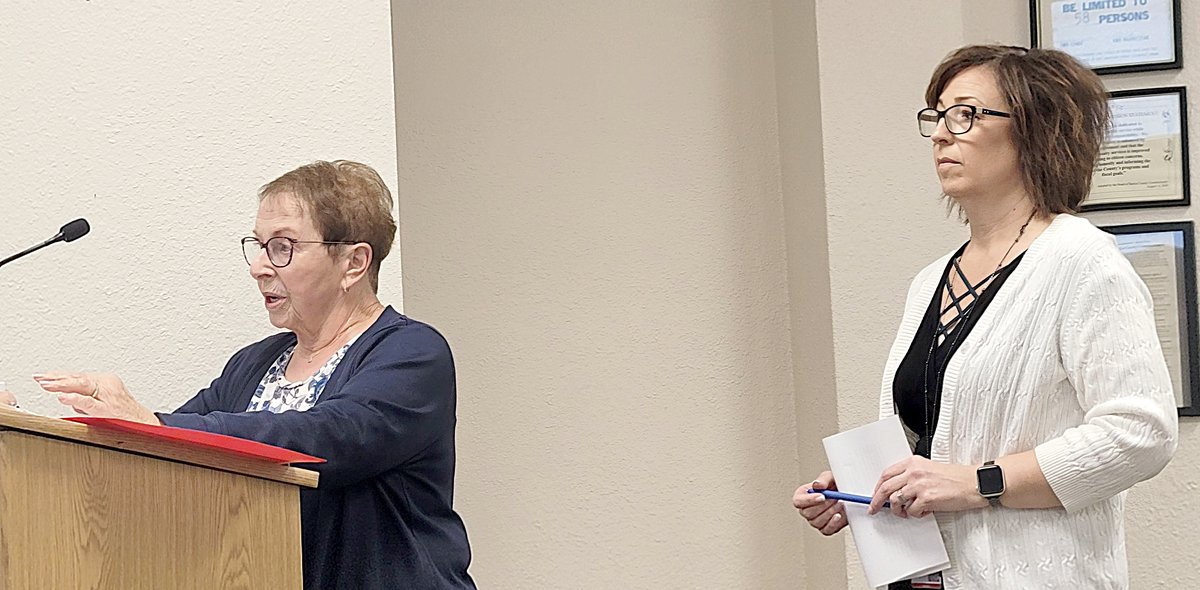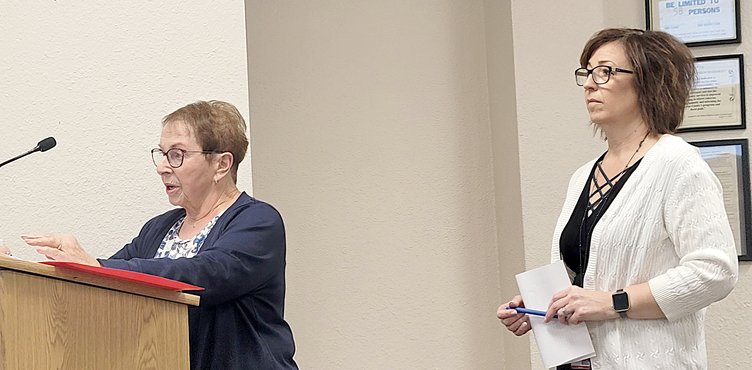Barton County Commission meeting at a glance
Here is a quick look at what the Barton County Commission did Wednesday morning:
• Heard a presentation on the Wall That Heals from Larry Parson, chairperson for The Wall That Heals/Great Bend Leadership Committee. This is a three-quarter scale replica of the Vietnam Veterans Memorial along with a mobile Education Center coming to Great Bend May 11-14.
The Wall will be located at Veterans Memorial Park’s Al Burns Field, and will be open 24 hours a day and free to the public, Parsons said.
• Approved a resolution establishing a temporary burn ban.
Persistent dry weather conditions have created a fire hazard situation within Barton County, said Emergency Risk Manager Amy Miller. Local fire chiefs have asked that the commission prohibit open burning in Barton County by declaring a temporary burn ban until conditions improve.
• Approved three Facade Improvement Grant applications:
– Michael G. Davis has requested $9,673.72 in grant funding to improve the building located at 158 S. Main, Hoisington. The building houses Cardinal Thrift Store. The $3,224.57 match by the applicant equates to 25% of the project.
– Colby Miller said Millers of Claflin Inc. has requested $20,000 in grant funding to improve the building located at 220 Main, Claflin. The $19,122.98 match by the applicant equates to 49% of the project.
– Grant and Shannon Unruh have requested $20,000 in grant funding to improve the building located at 1110 Main, Great Bend. The building houses Mitchell’s Bakery.
The $15,650.34 match by the applicant equates to 44% of the project.
• Held a discussion of the South Central Kansas Association of Commissioners and Engineers meeting that took place last Thursday and Friday in Hutchinson.
Commissioners Duane Reif and Donna Zimmerman attended the SCKACE meeting and they led a discussion on information presented.
• Approved a Courthouse HVAC improvement project lease agreement with Concept Commercials LLC for property at 1520 Main for a $4.62-per-square-foot flat rate. The building will house the Barton County Attorney’s Office.
• Approved the return of $26,296.81 COVID-19 grant funding awarded to the Barton County Health Department.
A review of grant reports by the Health Department indicate that certain remaining funding must be remitted back to Health and Human Services since the federal grant period had lapsed, County Administrator Matt Patzner said.
• Held a 15-minute executive session to discuss matters of attorney-client privilege regarding possible litigation involving the county. In the session were the commission, County Administrator Matt Patzner and County Counselor Patrick Hoffman.
No action was taken when the commission reconvened in open session.
• Heard statements from Central Kansas Community Corrections Director Amy Boxberger in response to Barton County Sheriff Brian Bellendir’s remarks at last week’s commission meeting that her office was allowing unlimited positive drug tests and not holding offenders accountable.
Retired 20th Judicial District Judge Hannelore Kitts summed up her response to Barton County Sheriff Brian Bellendir’s remarks at last week’s Barton County Commission meeting that Central Kansas Community Corrections was allowing unlimited positive drug tests and not holding offenders accountable.
“We’re all in this together,” said Kitts, who serves as chairperson for the CKCC Advisory Committee. “We’re all pulling on the same string.”
But, while we all want safe communities, one can't just “flip a switch” to stop people from committing crime and abusing drugs, she said.
Kitts, who retired in 2013, sat on the bench for 20 years after a career as a defense attorney. “This isn’t new. It changes all the time,” she said.
Kitts joined CKCC Director Amy Boxberger Wednesday morning during the discussion portion of this week’s commission meeting. Boxberger came under fire from the sheriff for what he called CKCC’s lax enforcement policies.
“So the sheriff has publicly stated that it is the policy of Central Kansas Community Corrections to allow probationers to have positive drug tests with no consequences,” Boxberger said. “I can assure you, in Barton County alone, I have a caseload of approximately 210 people on supervision and approximately 40 people in custody in Barton County Jail who would disagree with him.”
She said she has presented her policy to him and discussed case management strategy several times. “I provided information to law enforcement, stakeholders, commissioners, the Advisory Board and even informed the public via the County Commission meeting presentation on March 8. This is there is accountability.”
She said the sheriff has asked for a specific number of “dirty” urine-analysis tests that will send an offender to jail. But, “best practices are that not one size fits all,” she said.
Her policies follow years of research for evidence- based practices for community supervision to “effectuate cost-effective, long-term change to create a safer community as the Kansas Department of Corrections recommends.”
In the first quarter of this year (January through March) there have been 145 sanction violation responses from her office, she said. This is just Barton County, and her office covers the entire district which takes in Barton, Ellsworth, Rice. Russell and Stafford counties.
The role of CKCC
“So we are responding to violations,” she said. There are consequences, and when violations cannot be resolved with administrative sanctions, they ask a judge to sign a warrant.
Once that is signed and distributed to the Sheriff’s Office, law enforcement becomes responsible for bringing the offender before the court. “These people are no longer supervised by our agency,” she said.
For that reason, the person involved in the recent shooting at an office was not under CKCC supervision, she said. In fact, he had not been under their supervision since Feb. 28.
“We do our best to maintain our programming to minimize that risk,” she said.
“I appreciate the role that law enforcement pay plays and protecting our community,” Boxberger said. “We all are fighting the same war on drugs, just using different tools.”
Her staff wants to “show a growth mindset” to encourage those with substance-use disorders to maintain a clean public presence while working to improve their lives, she said.
“Recovery is happening. Accountability is happening,” she said.
The role of the board
Kitts said the Advisory Board is just that. “The board is not responsible for day-to day-operations of the Community Corrections. “We just approved the comprehensive plan for the operation of the Community Corrections” to assure the agency complies with Department of Corrections requirements.
The idea of Community Corrections in Kansas dates back to the late 1980s when the Legislature determined the state didn’t have the money to “warehouse” offenders and also did away treatment and education programs.
Now, the philosophy is to treat and rehabilitate offenders, she said. And, there can be no set number of drug tests to determine this success.
She chastised Bellendir for “railing against Community Corrections,” noting they are all saying the same thing. “We don’t want people to commit crimes.”





